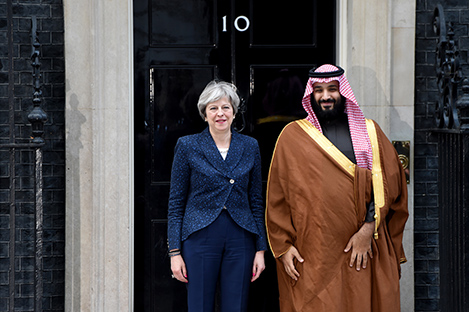
PM Thersa May welcoming Saudi Arabia Crown Prince Mohammad Bin Salman al Saudm at 10 Downing St on March 7 (Photo: Kate Green/AA)
London was overtaken by an extraordinary publicity campaign as Saudi Arabian Crown Prince Mohammad bin Salman arrived in Britain this month on his first overseas tour. Billboards and posters bearing the face of the 32-year-old heir to the throne adorned the motorway from the airport as well as being splashed on buses, bus stops and the sides of taxis and vans throughout the capital. ‘He is changing Saudi Arabia’ were among slogans in the charm offensive campaign.
His controversial three-day state visit was to present the 2030 Vision for the future of his country. Foreign Secretary, Boris Johnson, described it as a “sweeping reform programme” that would bring “positive economic and social changes” to Saudi Arabia. More important for him was the pledge of opportunities to bring £65bn to the UK over the next 10 years. This included the signing of a long-awaited memorandum of intent to buy 48 Typhoon fighter jets.
As protests during his visit showed, the Kingdom has a poor reputation in Britain. In particular, there have been accusations of Saudi Arabia spreading extreme ideology, having links to terrorists and of turning a blind eye to donors in the Kingdom providing funds for Daesh.
Over the past three years, there has also been significant Saudi involvement in exacerbating the civil war in Yemen, with human rights groups insisting that War Crimes have been committed and that the UN calling it one of the worst humanitarian disasters in the world. Yet the British Government continues to insist that the country’s rulers have been a source of stability in the region.
Johnson said that the UK looked forward to “building on the important and productive discussions during this visit on Yemen as we seek to find a political solution to the conflict.” No initiative though was announced. Johnson accepted that there were areas of disagreement, but maintained “working closely together allows us to have constructive discussions on these issues, and we have used this week as an opportunity to do that.”
Specifically mentioned were the opportunities to strengthen and broaden relationship into new areas, which were listed as in “education, healthcare, clean energy, culture, sports and tech.” All sectors were where Britain had “world-leading expertise and which are fundamental to the successful realisation of Saudi plans,” the Foreign Secretary said. No less than 13 were listed as being signed during the visit.
Despite concern about the Kingdom’s human rights record, the deals included an extraordinary aid cooperation agreement with Riyadh. The British Government claimed the “new long-term partnership” would improve livelihoods and infrastructure in the world’s poorest countries but Labour described the pact as a “national disgrace.”
Shadow International Development Secretary, Kate Osamor, accused ministers of making a “mockery” of Britain’s reputation as a global leader in delivering humanitarian aid. The aid agreement aligns Britain with the country “primarily responsible for one of the world’s biggest humanitarian crises” in Yemen and “will whitewash Saudi Arabia’s reputation and role in the war,” she said.
Not to be left out, Archbishop of Canterbury, Justin Welby, had a ‘private’ meeting with the crown prince, saying he was “encouraged” to learn about Saudi Arabia’s roadmap for the future. While Welby was said to have “shared” challenges and concerns of Anglicans from around the world, he emphasised the “crucial role that Saudi Arabia could play in protecting minorities across the world.” In return, Salman made a strong commitment to “promote the flourishing of those of different faith traditions, and to interfaith dialogue within the Kingdom and beyond.”
The more intimate relationship comes at a time when the UK is seeking new trade deals following the turmoil caused by the Brexit vote. The visit was set up when Prime Minister, Theresa May, travelled to Saudi Arabia not once but twice last year and also faced a barrage of criticism for ignoring human rights concern for the sake of making a “quick buck.” Particularly sensitive has been the use of British Tornados in an air campaign over Yemen conducted in breach of humanitarian law and the role of British military advisors in the bombing campaign.
Lost in the background has been Johnson’s criticism of the Saudi Government he made not long ago after he first became Foreign Secretary. Speaking at a conference in Rome in December 2016, he accused the Kingdom of abusing Islam for its own political ends and for acting as a ‘puppeteer’ by engaging in proxy wars in the Middle East. “There are not enough big characters, big people, men or women, who are willing to reach out beyond their Sunni or Shia or whatever group to the other side and bring people together,” he said.
At the time, the PM’s office tried to distance itself from the denunciations. A spokeswoman for May insisted that Saudi Arabia was “a vital partner for the UK, particularly on counter-terrorism and, when you look at what is happening in the region, we are supportive of the Saudi-led coalition which is working in support of the legitimate Government in Yemen against Houthi rebels.” The views of the Foreign Secretary are “not the Government’s views on Saudi and its role in the region.”
It is important to continue relations with countries across the world including totalitarian regimes. However, what is of concern, over and above the human rights abuses in the Kingdom, is the use of British arms in Saudi-led air attacks in Yemen which, according to human rights groups, have targeted civilians.
The UN estimates that the civilian casualty toll is approaching 10,000 killed, most by the Saudi-led coalition – and that ignores the humanitarian disaster that has, amongst other diseases, led to a million people being affected by cholera. We claim to be a champion of human rights – our actions say otherwise.